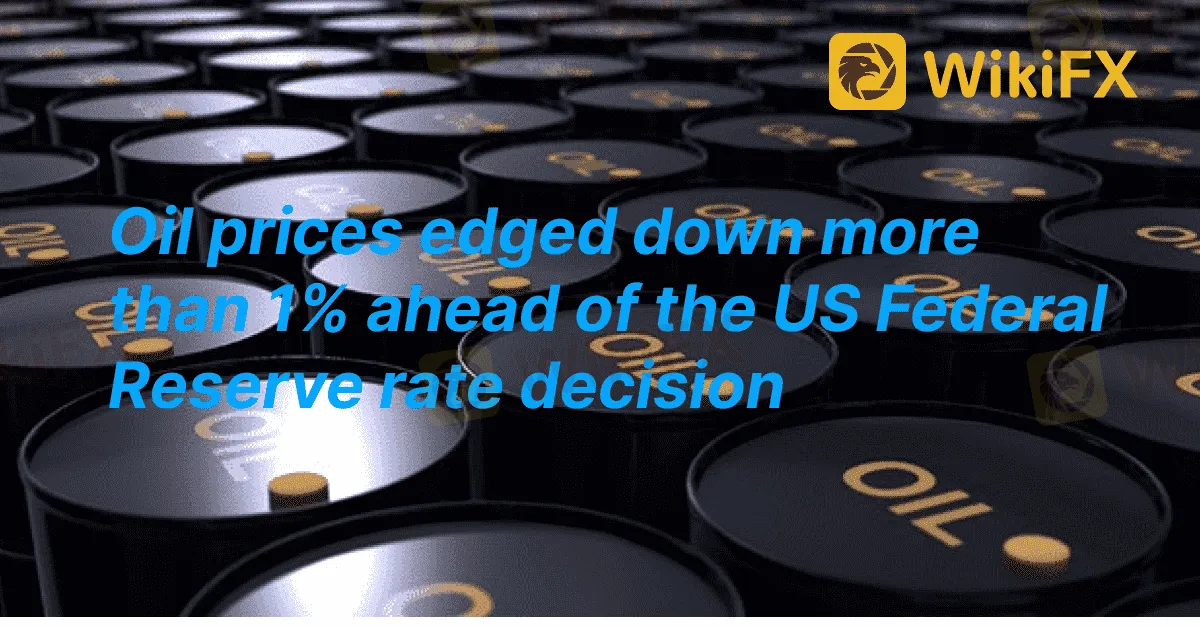简体中文
繁體中文
English
Pусский
日本語
ภาษาไทย
Tiếng Việt
Bahasa Indonesia
Español
हिन्दी
Filippiiniläinen
Français
Deutsch
Português
Türkçe
한국어
العربية
Oil prices edged down more than 1% ahead of the US Federal Reserve rate decision
Abstract:According to the report, Brent crude futures experienced a decline of 97 cents, equivalent to a 1.3% drop, reaching $73.82 per barrel by 0437 GMT. Similarly, U.S. West Texas Intermediate (WTI) crude also fell by 1.3% to $69.24 per barrel.

According to the report, Brent crude futures experienced a decline of 97 cents, equivalent to a 1.3% drop, reaching $73.82 per barrel by 0437 GMT. Similarly, U.S. West Texas Intermediate (WTI) crude also fell by 1.3% to $69.24 per barrel.
Last week, both benchmarks recorded their second consecutive weekly decrease due to concerns about demand growth in China, the world's largest crude importer. Disappointing economic data from China offset the positive impact of Saudi Arabia's commitment to cutting production by 1 million barrels per day (bpd) in July.
On Monday, oil prices declined as investors anticipated the U.S. Federal Reserve meeting to assess the central bank's stance on further interest rate hikes. Additionally, worries about China's fuel demand growth and the increasing supply of Russian crude weighed on the market.
In a note, Francisco Blanch from Bank of America Global Research described the current situation as a clash between bearish asset allocators, who highlight monetary contraction, and bullish oil speculators who anticipate lower inventories in the second half of 2023. Blanch believes that the bearish allocators will maintain dominance until the Fed eases money supply. Nonetheless, Bank of America still predicts that Brent crude will average around $80 per barrel in 2023.
The rate hikes by the U.S. Federal Reserve have strengthened the value of the U.S. dollar, making commodities priced in dollars more expensive for holders of other currencies. This has contributed to the downward pressure on oil prices.
Most market participants expect the U.S. central bank to maintain interest rates at their current levels following the conclusion of its two-day monetary policy meeting on Wednesday.
In a note, Morgan Stanley economist Seth Carpenter expressed the belief in a soft landing for the U.S. economy but cautioned that policy could tighten further if growth fails to slow down and if there are funding pressures in the banking system. Carpenter stated that these factors continue to pose risks skewed to the downside.
Regarding the supply side, while Saudi Arabia has reduced oil production four times over the past year, Russian supply has remained steady due to the strategic implementation of sanctions, which had a limited impact on output. Despite the European Union's embargo and the Group of Seven's price cap mechanism, Russian oil exports to China and India have continued to grow.
Goldman Sachs has revised its oil price forecasts downward due to higher-than-expected supplies from Russia and Iran. The bank also increased its 2024 supply forecasts for these two producers and Venezuela, adding a total of 800,000 bpd. Consequently, Goldman Sachs' December crude price projections now stand at $86 per barrel for Brent, down from $95, and at $81 per barrel for WTI, down from $89.

Disclaimer:
The views in this article only represent the author's personal views, and do not constitute investment advice on this platform. This platform does not guarantee the accuracy, completeness and timeliness of the information in the article, and will not be liable for any loss caused by the use of or reliance on the information in the article.
Read more

Bank Negara Malaysia Flags 12 New Companies for Unauthorised Activity
Bank Negara Malaysia (BNM) has updated its Financial Consumer Alert List (FCA List) by adding 12 more entities, reinforcing its efforts to warn the public against unregulated financial schemes. Check if your broker made the list!

TradingView Brings Live Market Charts to Telegram Users with New Mini App
TradingView has launched a mini app on Telegram, making it easier for users to track market trends, check price movements, and share charts.

March Oil Production Declines: How Is the Market Reacting?
Oil production cuts in March are reshaping the market. Traders are closely watching OPEC+ decisions and supply disruptions, which could impact prices and future production strategies.

How to Calculate Leverage and Margin in the Forex Market
Leverage amplifies both potential profits and risks. Understanding how to calculate leverage and margin helps traders manage risks and avoid forced liquidation.
WikiFX Broker
Latest News
Exposing the Top 5 Scam Brokers of March 2025: A Closer Look by WikiFX
Gold Prices Climb Again – Have Investors Seized the Opportunity?
Webull Launches SMSF Investment Platform with Zero Fees
Australian Regulator Warns of Money Laundering and Fraud Risks in Crypto ATMs
The Withdrawal Trap: How Scam Brokers Lure Victims into Paying More
FCA to Investors: Think Twice Before Trusting These Brokers
Trump\s tariffs: How could they affect the UK and your money
Trump gambles it all on global tariffs he\s wanted for decades
TradingView Brings Live Market Charts to Telegram Users with New Mini App
Trump tariffs: How will India navigate a world on the brink of a trade war?
Currency Calculator







